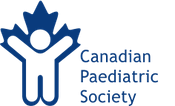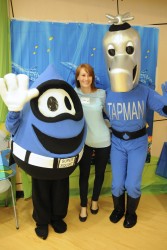Halifax paediatricians work with community to improve pre-schooler nutrition
Posted on January 27, 2014 by the Canadian Paediatric Society | Permalink
Topic(s): Public education, Advocacy
The keys to successful paediatric advocacy are community engagement, collaboration and simple messaging, according to Dr. Tara Chobotuk and Dr. Heather Rose, who launched a campaign encouraging Halifax preschoolers to drink water between meals.
The idea for the campaign, called “Tap the Tap,” came about two years ago, after they helped establish a paediatric clinic in the neighbourhood of Spryfield.
Before the clinic opened, the health team held several meetings with community organizations, where they learned that preschooler nutrition was an important issue to parents. They then assembled a group of community members, which included partnering with the local family resource centre, a local daycare, public health and IWK Primary Health, as part of its role with the Capital Health Community Health Team.
In response, the group decided to launch a campaign to encourage parents to replace unhealthy or nutritionally empty beverages with water, especially between meals.
It’s a simple idea, but one that has the potential to really change preschoolers’ daily nutrition, say Dr. Chobotuk and Dr. Rose. Offering their children water is something parents can do at no cost, and the message is easy for preschoolers to understand.
The range of potential health problems from over-consumption of milk or sugar-sweetened beverages includes dental caries, picky eating, malnutrition, unhealthy weight gain and obesity.
“Toddlers often move from using a bottle or breastfeeding to the use of a sippy cup. If these are carried around all day long containing sugar-sweetened beverages, teeth are bathed with sugar and toddlers are filled with empty calories,” said Dr. Rose. “Sippy cups should be filled with water except at mealtimes.”
After finalizing the campaign’s messaging, the health team then recruited the help of local high school students. Art students designed the campaign mascots, ”Tap Man and Super Squirt,” music students set the campaign jingle to music and film students helped create a video that brought all of these elements together.
The collaborative approach has helped to ensure that “Tap the Tap” is truly a community-oriented campaign.
“I think one of the biggest successes of our project was getting everybody together to discuss this issue and getting engagement from the key stakeholders to work together towards our goal,” said Dr. Chobotuk.
In May 2013, the campaign was launched in Spryfield at an event attended by 250 families with pre-school aged children. Tap the Tap has since been launched in a Dartmouth neighbourhood, and was recently rolled out at the IWK Health Centre in Halifax.
To date, response to the campaign is promising. Chebucto Family Resource Centre continues to be free from juice. Community organizations such as daycares, and the family resource centre, are now using Tap the Tap resources to spread the message to families. A local Mi’kmaq Friendship Centre is also interested in getting involved.
Part of the IWK launch will include a Grand Rounds session, which Drs. Chobotuk and Rose hope will help spread the message to their colleagues and to patients of any age. Following Grand Rounds, resources and messages to support the project will be shared on the IWK Health Centre website so other communities can get involved.
“With our project, we originally targeted families that had preschoolers, but we hope that it’s going to benefit their whole family,” said Dr. Chobotuk. “We’re also hoping that this message will spread to other physicians who will then spread it to their patients, regardless of age.”
To learn more about Tap the Tap, please contact IWK Primary Health at 902-470-7320 or visit http://www.iwk.nshealth.ca/page/healthy-habits-healthy-families.
Copyright
The Canadian Paediatric Society holds copyright on all information we publish on this blog. For complete details, read our Copyright Policy.
Disclaimer
The information on this blog should not be used as a substitute for medical care and advice. The views of blog writers do not necessarily represent the views of the Canadian Paediatric Society.
Last updated: Jan 29, 2014

